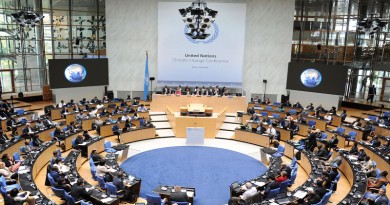FG to explore Jatropha plant to tackle emissions, desertification
Amidst current efforts by the government to diversify the economy, curb green house gas emissions and tackle the massive desertification ravaging the northern part of the country, the Federal Government of Nigeria is set to explore the potentials of Jetropha crop to reduce green house gas emissions and tackle desertification.
Towards this, a two-day inaugural edition of ‘The Environment Dialogue’ tagged; Diversification of the Economy, The Role of Jetropha, was held during the week where stakeholders agreed that the crop has numerous benefits
According to them, Jatropha has been identified by the Nigerian Bio-fuel Policy and Incentives 2007 as the most preferred non-food plant for bio-fuel feedstock for production in the country. This Policy as well as the NNPC’s Renewable Energy Division were set out to link the agriculture and energy sectors and promote job creation, technology acquisition attract foreign investment in the bio-fuels industry.
The Jatropha crop has numerous benefits. One of the advantages of the crop is that each and every part of the plant can be used in one way or the other. The life span of the Jatropha crop, according to experts is 40 years, and as each year goes by, the yields of the crop increase.
The Minister of Environment, Mrs. Amina Mohammed, in a chat with journalists at venue of the dialogue said that the ministry is working with the framework that is being set by the Ministry of Agriculture for the diversification of the economy.
According to her: “We are working with the frame work that is being set by the Ministry of Agriculture for the diversification which spark the incredible interest that everyone has now to find a solution to diversification.
“One of the things we want to do is to reduce emissions and reclaim our desert. We also want to see an economic value by creating jobs and creating economic value chains that will provide returns for people that have jobs. We see this by empowering young people because they are the group of people that will participate in growing the Jatropha seeds.â€
The Jatropha seed is “beneficial to young people especially,†Mohammed remarked.
On how young people would benefit from growing Jatropha seeds, Mrs Mohammed explained that everyone has a place in diversification of the economy.
“Let me talk about production side; there is modern farming and it involves agriculture, science and young graduates. We want those businesses not to just be small scale, we want them to grow. We require business minds and entrepreneurs to take the growing of Jatropha seeds up and do things differently from how its being done. I do see a big role for graduates,†the Minister said.
She said further that there is job for everyone, – a job with dignity.
“The private sector has to take risk and know they can make profit without losing anything but gaining considering the diversification and bringing their own innovation to help us be more efficient,†Mrs Mohammed said.
Similarly, Minister of Agriculture, Dr Audu Ogbeh, in his speech said the diversification of the economy, putting in view role of the Jatropha seed is a joint effort with the Ministry of environment.
He noted that the Jatropha seed is a non-edible product which also generates fuel and is environment friendly.
“Our job is to liaise and work with the Ministry of Environment to make the production of the crop seedlings available and in that synergy, we begin to satisfy the need of diversification of the economy,†Ogbeh said.
The Jatropha seed, if efficiently utilised can fetch about a 100,000 litre of diesel every year.
The Agric Minister urged peasant farmers to take advantage of planting the Jatropha seedlings on their farmland. He explained that the plant can be used to fence farm land as its scent drives away cattle from invading farmland.
Senator Remi Tinubu, Chairperson, Senate Committee on Environment who also represented the Senate President and Minister for Water Resources – Suleiman Oseni Adamu presented goodwill messages
In the same vein, Speaker of the House of Representatives, Yakubu Dogara, in his address said that the Jatropha project will create an enormous value which will not only provide alternative farming strategies and livelihood options but creates multiple streams of income for farmers.
The Speaker who was represented by Hon. Obinna Chidoka stated that the National Assembly and in particular the House of Representatives is aware that the consumption of fossil fuels for transportation, heating and power generation is contributing enormously to the increase of greenhouse gas emissions in Nigeria.
“We are committed to creating enough legislation, enabling policy and regulatory environments that would promote a safe, sound and sustainable environment in order to accelerate the shift to a new carbon trajectory.
“We shall work together with the Executive, the international community and indeed stakeholders to make this happen,†Chidoka said.
Speaking at the event, the Chairman of the dialogue, Gov. Kashim Shettima of Borno, said that the government started the Jatropha project well in Borno until the Boko Haram sabotaged the state. “They destroyed all that we had started to achieve including 7,000 hectares wheat farm which created 28,000 direct jobs in one single farming activity that the BOSG fully funded through collaboration with the Chad Basin Development Authority” the governor said
The Governor emphasised that Borno State Government will be more than willing to play any role in working with the Federal Government on this project
The dialogue, held at the NAF Conference Centre end on 5th October, 2016. It explored ways and approach the Jatropha crop would improve and add positive value to the economy by creating jobs and generating biofuel.




